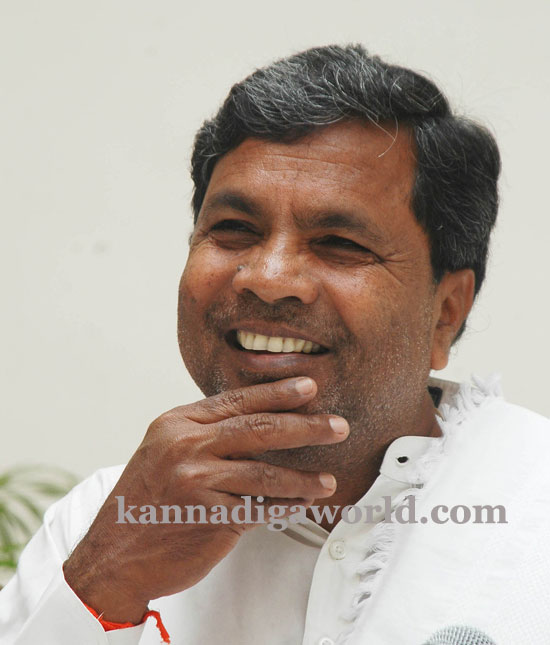Bangalore, P M Raghunandan , May 15: Chief Minister Siddaramaiah’s announcement of the Re1 per kg rice scheme to the poor under the public distribution system (PDS) will cost the exchequer Rs 2,373 crore a year, up Rs 1,173 crore from this year’s budget estimate.
As promised in the Congress election manifesto, the state government is firm on supplying 30 kg of rice at Re 1 a kg to nearly 87 lakh people below the poverty (BPL) families ahead of the Lok Sabha elections.
While announcing the largesse on his first day in office, Siddaramaiah did not announce or direct officials as to how to check pilferage or smuggling of foodgrain from Karnataka. Smuggling of rice from Tamil Nadu, where it is distributed to the poor free of cost, to other states is rampant.
The Bharatiya Janata Party (BJP) government was no better when it came to announcing populist measures. Jagadish Shettar as chief minister had announced a loan waiver of Rs 25,000 per farmer citing drought as the reason. The loan recovery by financial institutions used to be not less than 90 per cent when he made the announcement which eventually imposed a Rs 3,600-crore burden on the state’s exchequer.
The waiver benefited about 15 lakh families. This was also perceived as a populist measure of the BJP government, whose image had taken a major beating.
As per the plan prepared by the government for implementing the rice scheme of the Congress government, a total of 2.88 lakh metric tonnes (MT) of rice is required per month. But the Centre’s Food Corporation of India (FCI) allots only about 1.42 lakh MT per month to the State. So, the government needs an additional 1.46 lakh MT of rice per month to implement its scheme, which will be launched on June 1, 2013.
The government has, therefore, decided to approach the Centre, seeking additional rice for implementing the scheme. Even if the Centre agrees to provide such a huge quantity of rice, the State government will have to bear the financial burden, which is estimated to be Rs 2,373 crore. Any additional foodgrain provided to the State will be at the above poverty line (APL) rate, sources said.
Siddaramaiah, while announcing the scheme, had claimed that the additional burden to the State exchequer will be Rs 460 crore per annum.
FCI provides rice in three broad categories under the PDS depending on the population figures. The issue price for each category varies: Antodaya Anna Yojana (Rs 3 per kg), BPL (Rs 5.65 per kg) and APL (Rs 8.30 per kg).
With the government deciding to provide rice at Re 1 per kg to an estimated 87 lakh BPL families, it has to subsidise the difference amount under all categories. Under the existing PDS, the government is supplying a maximum of 20 kg rice per BPL family at Rs 2 per kg. The department is following the unit system wherein every member of the family is considered a unit, which will get four kg rice per month.
As a result, what the State has been getting from FCI as its quota (1.42 lakh MT per month) has been sufficient. The government had estimated that food subsidy would be about Rs 1,200 crore in the current financial year.
The Siddaramaiah government has now decided to do away with the unit system from this month-end and it will, instead, provide a flat 30 kg per family per month. The subsidy amount is, therefore, estimated to shoot up from Rs 1,200 crore to Rs 2,373 crore.
If the Centre refuses to give additional rice, the State government will be left with no option but to purchase from the open market, where rice is estimated to cost Rs 24 to Rs 26 per kg. For purchasing 1.46 lakh MT of rice per month at Rs 24 per kg, the government has to spend Rs 6,650 crore a year, official sources explained.
At Rs 6,650 crore, the food subsidy will surpass the State’s power subsidy (currently Rs 5,750 crore) to become the sector providing the highest subsidy.
Sources said the chief minister told officials that there is no going back on making available rice at Re 1 a kg because the Congress had promised it to the people in its election manifesto.
Official sources said smuggling of rice, wherever it is available at cheaper price, is very common. In addition, lower price rice is also sold for higher price to hotels and traders. This is one of the reasons as to why rice has become a costly commodity in the open market even when the stock is plenty.
The government must spend a few crores of rupees to use technology to monitor truck load movement of foodgrain to ensure that subsidised items do remain within the State. Global positioning system may help in tracking trucks. Though the intention to help the poor is understandable, checking pilferage is also crucial, sources said.
Burden of promise
* Govt has to spend estimated Rs 2,373 crore for the scheme
* It needs additional 1.46 lakh metric tonnes rice per month
* State to urge Centre to supply additional rice
* If Centre refuses, State has to purchase from open market

